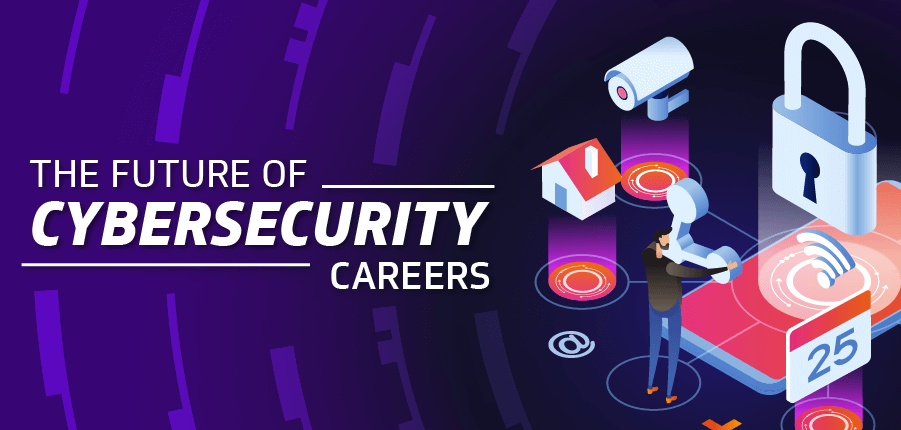
PUBLISHED OCTOBER 4, 2019
What Does a Future Cybersecurity Career Look Like?
It’s never been a better time to be an IT professional in the cybersecurity domain.
Cybercrime damages will cost the world $6 trillion annually by 2021, up from $3 trillion in 2015. Cyberattacks are also the fastest growing crime in the U.S., increasing in size, sophistication and cost. As companies endure paralyzing, malicious attacks and costly data breaches, the race to find professionals to defend their data, devices and infrastructure rises in priority.
Emerging fields creating a massive need for career professionals within the cybersecurity space include the Internet of Things, ethical hacking and artificial intelligence.

Internet of Things
The Internet of Things has brought countless benefits to our lives. About a decade ago, the idea of a smart washing machine or a web-enabled stove sounded like science fiction. Today, our lives are made easier by the birth of smart devices, from Alexa to Google Home.
But, there’s a catch. Many smart inventions weren’t designed to keep our data confidential or secure. In fact, some of the products we’ve embraced into our daily lives are still quite new with many bugs being worked out. The latest and greatest smart devices aren’t exempt either.
Have you ever wondered if Alexa stops listening to you?
These smart devices collect vast amounts of personal data. Intelligent products are designed to give us more control, but what happens when that data becomes vulnerable?
There is a growing need for professionals skilled in understanding data’s potential and pinpointing opportunities for security risks. As the number of IoT devices is projected to soar into the billions, the number of cybersecurity jobs within the IoT space will increase too.
Responsibilities:
- Using intelligent encryption to protect IoT devices
- Providing security updates and software patching
- Strengthening cloud security and incorporating access controls
- Designing analytics programs to detect security breaches


Ethical Hacking
The age-old adage “to beat a criminal you have to think like one” has never been truer for the expanding field of cybersecurity. As cyberattacks continue to surge, more organizations are employing ethical hackers to thwart cybercriminals.
Ethical hackers use knowledge from the hacking world to protect organizations by employing creativity and anticipating human behavior. Simply put, these white hat hackers find potential vulnerabilities before black hat hackers or bad hackers do.
Getting one step ahead of threats is critical to ensuring cybersecurity posture for any business. That’s why when it comes to future-proofing your career, ethical hacking is an excellent choice.
Responsibilities:
- Conducting penetration tests to identify system vulnerabilities
- Analyzing risk assessment to provide remediation
- Mocking breaches to develop new security posture measures
- Staying abreast of the latest security threats
- Developing policies to ensure best practices for security


Artificial Intelligence
Black hat hackers are always changing their strategies, and it’s become a full-time job to understand past attacks to prevent future ones. A human being can only learn so much at a set pace, but with AI, businesses are much more effective.
Using AI has several benefits, including swiftly identifying new weaknesses and analyzing data and multiple systems simultaneously at scale. AI-based malware detection uses learning algorithms to generalize or “learn” how to distinguish between good and bad files. It can detect malware and block it during runtime, essentially catching malware in the act.
Yet, AI is not the silver bullet. By itself, it cannot stop a cyberattack. AI can minimize task work; however, it still must alert humans when interference is required. “It’s critical that employees are trained on how to interact with AI,” said Kforce Chief Information Officer Denis Edwards. Machine learning systems should encourage human interaction, so AI systems aren't the sole authority.
Now, organizations are exploring the employment of AI in their cyber risk operations—how AI will interact with humans and vice versa.
The role of the security professional in the artificial intelligence space is becoming more popular. For those who want to be on the cutting edge of technology, artificial intelligence is one of the best career fields to be in.
Responsibilities:
- Training machine learning algorithms to trigger alerts
- Reducing labor overhead with automation
- Making informed decisions about prioritized risks
- Analyzing and coordinating findings made by intelligent systems

Future proof your career
For job seekers searching for a future-proof career, the cybersecurity field remains promising for many years to come. The sector continues to expand across industries while converging into multiple domains including the Internet of Things, ethical hacking and artificial intelligence—creating new skill sets to solve tomorrow’s problems. Those with a knack for discovery, curiosity and learning are on the path to finding tremendous success in this limitless field.


